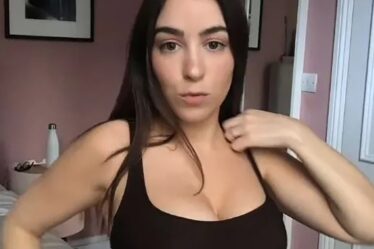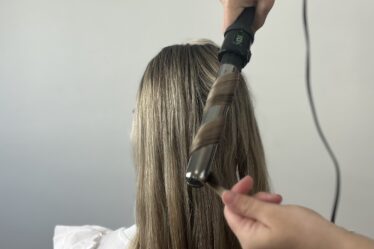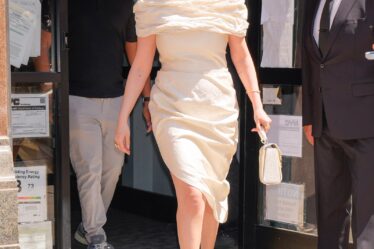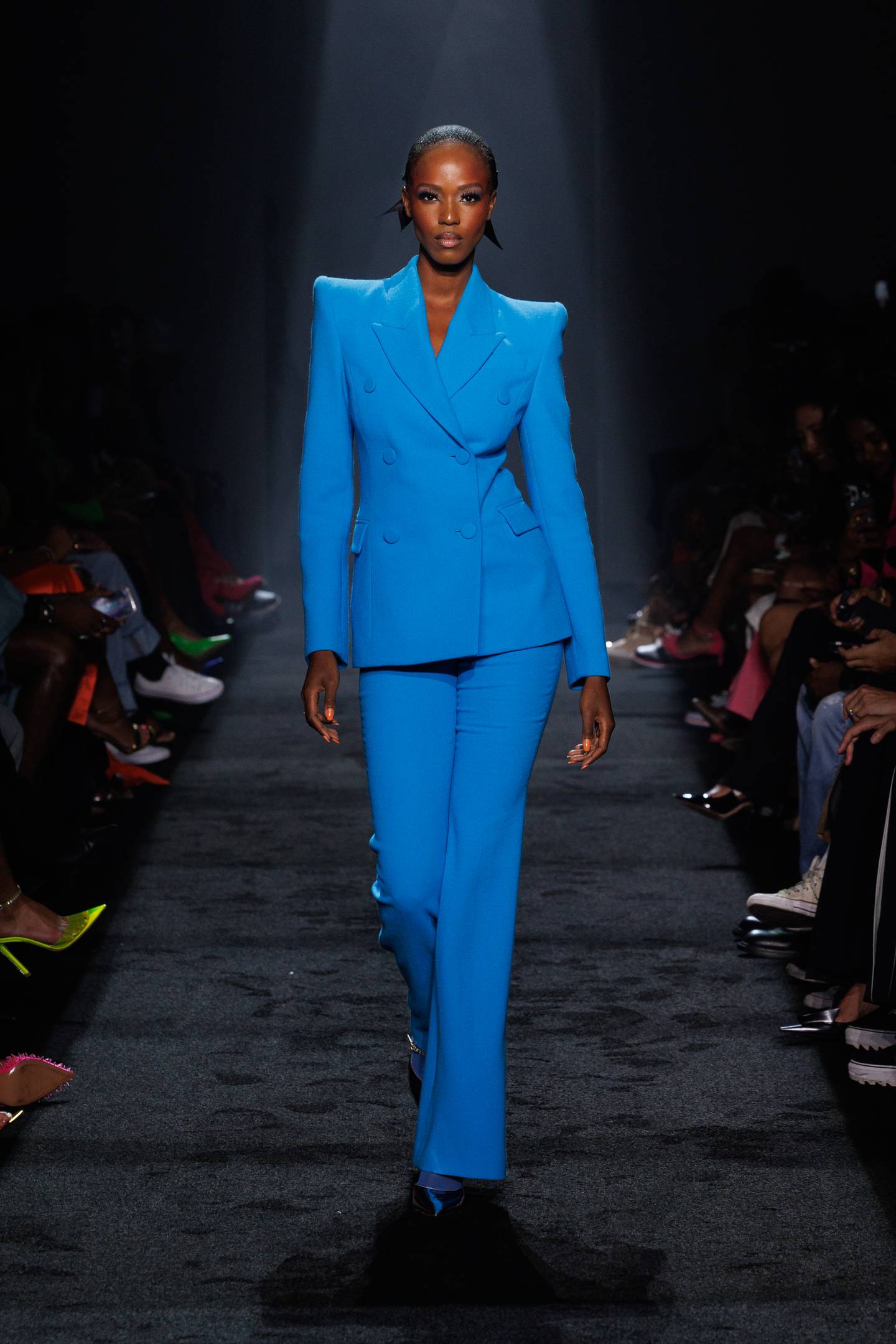
“Let me show y’all what I’m working with… hold up y’all it’s my turn now, hold up y’all it’s our turn now.”
Vocals from American hip-hop artist Trina, who rose to fame in the early aughts with albums like “Da Baddest Bitch” blare across the speakers as models strut onto the runway for Sergio Hudson’s Spring/Summer 2024 runway show at Spring Studios in New York on Sunday evening.
This particular song, “Told Y’all” sets the tone for Hudson’s more pointedly unapologetic aesthetic and attitude this season. The designer sent plenty of his signature motifs down the runway — dramatic shoulders, sharp blazers and bold colours — but also added muted tones like browns and olive greens along with a sprinkling of sequinned skirts.
“The intention in the show was to solidify the Sergio Hudson woman and to solidify the brand as a mainstay,” Hudson told BoF backstage after the show. “We’re not going anywhere. And we’re only going to grow from here.”
Hudson has many reasons to be excited this season. He’s newly married, has found a new artistic muse in actress Keke Palmer and is arguably among the most celebrated designers showing at New York Fashion Week, winning designer of the year at Essence’s Best in Black Fashion Awards just the week before.
But the designer’s self-assuredness mirrors that of many Black designers, influencers, stylists and makeup artists at New York Fashion Week this season — even as some sense their window of opportunity is closing.
Black creatives were bombarded with new opportunities in the three years following the social justice uprisings of the summer 2020. For many, that initial windfall — including pickups by major retailers, attention from big media and partnerships with global brands — was a dizzying rush that amounted to little in the way of lasting business. At worst, the attention culminated in smoke and mirrors, a glimpse at what success in mainstream fashion might look like, without the long-term support to make it a reality.
Recent developments — notably the US Supreme Court’s ban on affirmative action at colleges and universities and an uptick in backlash against corporate diversity, equity and inclusion initiatives led by conservative politicians — have all contributed to a general receding of DEI momentum.
At the same time, the number of Black designers and artists has increased since 2020. Some Black creatives say this tougher environment has spurred them to be more emboldened in their work — and to care less about being the recipient of what some see as performative pandering by fashion’s gatekeepers.
A palpable confidence as well as a collective refocusing among Black creatives on spaces where they are celebrated rather than tolerated was apparent at smaller events like Black influencer agency Kensington Grey’s panel and cocktail reception last Thursday, where Harlem couturier Daniel “Dapper Dan” Day took the stage to speak to a standing-room-only crowd. It also showed up in bolder and evermore star-studded showings by Hudson and LaQuan Smith, whose energetic, glamorous spectacle on Monday night saw models stomping onto the runway as entertainers like actresses Coco Jones, Laverne Cox and Quinta Brunson as well as singer Mary J. Blige sat front row.
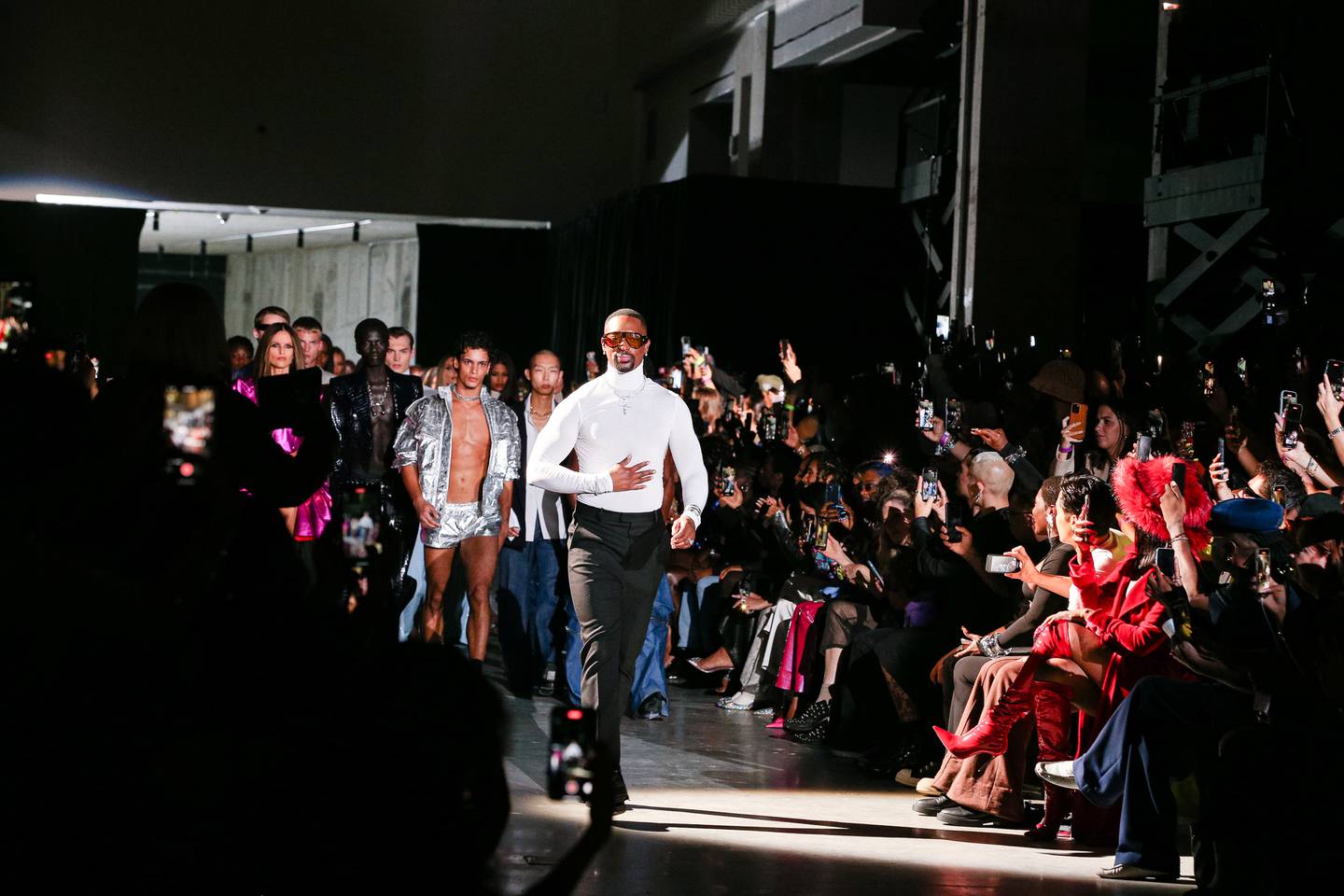
“Three years ago, because representation was so limited, any time you got even a look you would say ‘I have to take this opportunity because I can’t afford not to,’” said Rebecca Allen, founder of her eponymous shoe line and beauty brand Helix Hair Labs, who participated in NYFW adjacent event Founders House NYFW, a BIPOC-focused activation sponsored by Kendra Bracken-Ferguson’s BrainTrust Founders Studio and Chase Ink. “Now people can lift their heads up a little bit and can be more strategic, more thoughtful, and intentional.”
Celebrated, Not Tolerated
A few seasons ago, the ultimate goal for many Black designers was to appear on the official fashion week calendar, which is organised by the Council of Fashion Designers of America.
Now, Fashion Week adjacent events put on by organisations like Harlem’s Fashion Row — which may have in the past been viewed as consolation prizes for Black designers who didn’t make the main stage — have become a main event in their own right.
A who’s who of fashion and cultural tastemakers walked the red carpet and took the stage at the Harlem Fashion Row’s 16th Annual Fashion Show and Style Award Musician — A$AP Rocky, Dapper Dan, LVMH chairman and CEO for North America Anish Melwani, Harper’s Bazaar’s Samira Nasr and Vogue’s Gabriella Karefa-Johnson among them.
For some, there was a new enthusiasm around smaller, more intimate showcases that didn’t stake their success to the wider conversation around diversity.
Designer Charles Harbison showed his “easy, joyful” and “optimistic luxury” Spring/Summer 2024 collection to an invite-only crowd of editors, photographers, models and influencers at a suite in the Thompson Central Park New York hotel on Tuesday, followed by a dinner at Bondst Hudson Yards.
“My baseline, my ground zero is that I love this and I know I’m great at it,” Harbison said. “If my Blackness was dujour for a moment, I can talk about that. Whenever gender inequities are dujour, I’m happy to talk about that, too… But at the end of the day, I’m not staking my claim or my significance on any identity politics.”
Dafina Smith, founder of the customisable high-end hair extensions brand Covet & Mane, had been approached by several labels participating in NYFW asking her to provide hair for their shows — touting, among other things, “visibility” and “access” to the coveted Fashion Week runway.
After mulling over those requests, Smith decided the benefits of gifting her proprietary hair wefts or providing trained stylists free of charge didn’t outweigh the costs.
Instead, this season Smith offered up her space as the venue for the Founders House NYFW, the same event Allen participated in — featuring a mix of industry panels and shopping showcasing Black-owned brands, influencers and tastemakers.
“There’s really something to be said about being able to create our spaces to celebrate what we do, and not having to wait for somebody to invite us to the stage or to celebrate us — because we know our greatness,” said Bracken-Ferguson, founder and CEO of BrainTrust, which comprises a BIPOC-focused beauty and wellness agency and a venture fund. “We know that we’re supposed to be there… and we can’t wait because nothing was given to us.”
Kensington Grey’s Sept. 8 cocktail reception and panel was sponsored by Pandora, LTK and L’Oréal. Jeneé Naylor, a fashion influencer who spoke at the reception, told BoF she has gotten savvier about the events she’s saying “yes” to this year and becoming more confident in her own value as a fashion tastemaker.
“After the last few seasons of running around and eating room service every day and then at the end of it, leaving New York with nothing left in the tank, I’ve realised we should just be executing at the highest level where we’re wanted — instead of just doing things halfway just because we’re [excited] to be asked to be somewhere,” she said.
Raisefashion, a nonprofit offering pro bono consulting and other services to BIPOC-owned brands, hosted a showcase for nearly two dozen designers, including clothing label Busayo, shoe brand Kendall Miles and apparel brand Àwet New York, on Sept. 6 at The Standard Hotel, High Line. (The Standard offered up the space free of charge.) The event garnered visits from buyers at Neiman Marcus, Bergdorf Goodman, Saks Fifth Avenue and Dover Street Market among others.
For the showcase, Raisefashion, which has a network of 250-plus designers, invited only brands its board believed were among “the most scalable,” or ready to take on a large wholesale partnership, said Felita Harris, executive director and founding board member at Raisefashion.
“We’ve realised that we do need to set criteria around how we prioritise brands” she said. “We’re leaders who have scaled businesses… it’s important that we don’t approach BIPOC designers with charity in mind, because these designers see revenue success for themselves, they want to be the next multi-million-dollar brand.”

